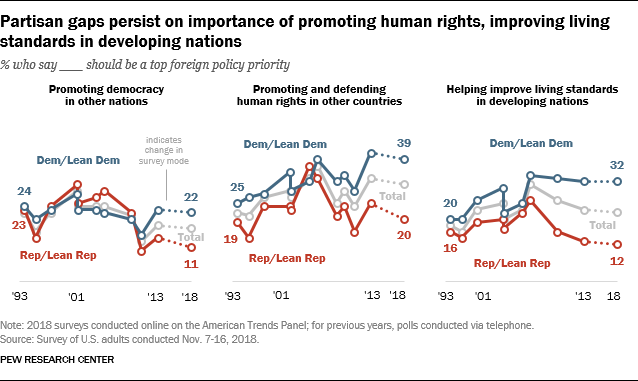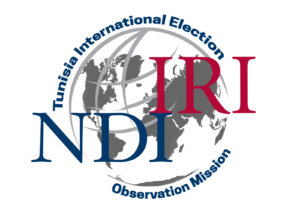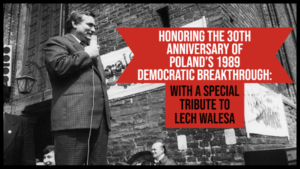The cluster of organizations around the National Endowment for Democracy has evolved into “a huge apparatus” with its strong norms and operational principles, one expert observes, at a time when the purpose and principles of US foreign policy are being reconsidered.
Across the partisan divide, there is a sense among Americans, as a recent report from the Carnegie Council for Ethics in International Affairs concludes, that U.S. international engagement must be amended—with a renewed focus on how foreign policy connects to the doorstep issues of average Americans, notes Nikolas K. Gvosdev, the chair of economic geography and national security at the U.S. Naval War College. There is also a renewed suspicion of losing sovereignty or decision-making to bodies beyond voters’ reach and control, he writes for the National Interest.
Americans are never going to be isolationists—because U.S. security and prosperity do depend on U.S. interaction with the rest of the world, Gvosdev believes. The question is the degree and depth of that interaction.

U.S.-based organizations that promote democracy and governance insist that domestic political divisions have not undercut their work or damaged international programs characterized by professionalism and bipartisanship, writes Michael Igoe@AlterIgoe, a Senior Reporter with Devex, based in Washington, D.C.
 “I’ve seen no impact on the work that we do or the support that we get around the world for doing it,” said Derek Mitchell, president of the Washington-based National Democratic Institute. “People recognize that after 35 years of our doing this, that we have a track record, that we go in according to context, and we’re not looking to interfere, we’re looking to support,” he said.
“I’ve seen no impact on the work that we do or the support that we get around the world for doing it,” said Derek Mitchell, president of the Washington-based National Democratic Institute. “People recognize that after 35 years of our doing this, that we have a track record, that we go in according to context, and we’re not looking to interfere, we’re looking to support,” he said.
The International Republican Institute, NDI’s sister organization, has remained similarly insulated from Washington’s turmoil, said Daniel Twining, IRI’s president. “You go to Nigeria, and they don’t want to talk about American politics. They want to talk about how we can help them in Nigeria to have a stronger democracy….I started this job just over two years ago, and I thought we’d grapple with this much more directly in the world. We actually grapple with it much less than I expected,” he told Igoe:
 The network of organizations that includes the National Endowment for Democracy, IRI, NDI, and others has evolved into “a huge apparatus” with its own strong norms and operational principles, said Sarah Mendelson, a professor at Carnegie Mellon University who previously led the U.S. Agency for International Development’s democracy programs during the Obama administration. “People who know what they’re talking about understand that these organizations are distinct, have distinct reputations, have long histories of working on these issues,” she said.
The network of organizations that includes the National Endowment for Democracy, IRI, NDI, and others has evolved into “a huge apparatus” with its own strong norms and operational principles, said Sarah Mendelson, a professor at Carnegie Mellon University who previously led the U.S. Agency for International Development’s democracy programs during the Obama administration. “People who know what they’re talking about understand that these organizations are distinct, have distinct reputations, have long histories of working on these issues,” she said.
That independence leaves them less vulnerable to any particular politician’s outlook or behavior, observers suggest.
 Countering illiberal actors is essential for maintaining democratic norms, the US House of Representatives was told yesterday at a session on Democracy and the NATO Alliance: Upholding our Shared Democratic Values (above). Speakers included His Excellency Lech Walesa (left), Founder, Lech Walesa Institute, Former President of the Republic of Poland. Ms. Melissa Hooper, Director, Foreign Policy Advocacy, Human Rights First. Ms. Susan Corke, Senior Fellow and Director, Transatlantic Democracy Working Group, The German Marshall Fund of the United States. Mr. Nate Schenkkan, Director for Special Research, Freedom House. Matthias Matthijs, Ph.D., Senior Fellow for Europe, Council on Foreign Relations.
Countering illiberal actors is essential for maintaining democratic norms, the US House of Representatives was told yesterday at a session on Democracy and the NATO Alliance: Upholding our Shared Democratic Values (above). Speakers included His Excellency Lech Walesa (left), Founder, Lech Walesa Institute, Former President of the Republic of Poland. Ms. Melissa Hooper, Director, Foreign Policy Advocacy, Human Rights First. Ms. Susan Corke, Senior Fellow and Director, Transatlantic Democracy Working Group, The German Marshall Fund of the United States. Mr. Nate Schenkkan, Director for Special Research, Freedom House. Matthias Matthijs, Ph.D., Senior Fellow for Europe, Council on Foreign Relations.







